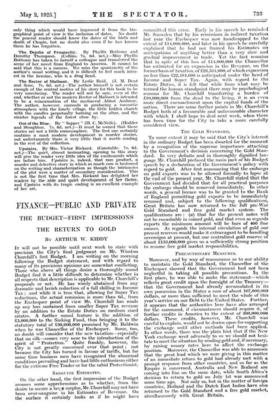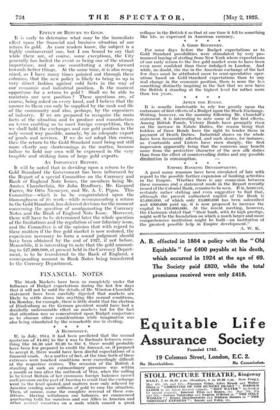FINANCE-PUBLIC AND PRIVATE
BY ARTHUR W. KIDDY IT will not be possible until next week to state with precision the City's final judgment on Mr. Winston Churchill's first Budget. I am writing on the morning following the Budget statement, and with regard to many of its provisions opinions are somewhat conflicting. Those who above all things desire a thoroughly sound Budget find it a little difficult to determine whether in all respects that description is applicable to Mr. Churchill's proposals or not. He has wisely abstained from any dramatic and lavish reduction of a full shilling in Income Tax ; and while it is true that, allowing for Super Tax reductions, the actual remission is more than 6d., from the Exchequer point of view Mr. Churchill has made up any loss sustained from smaller Super Tax revenue by an addition to the Estate Duties on medium sized estates. A further sound feature is the addition of £5,000,000 to the Sinking Fund, thus bringing it to the statutory total of £50,000,000 promised by Mr. Baldwin when he was Chancellor of the Exchequer. Some, too, no doubt will consider that the new taxation—especially that on silk—comes very near to the introduction of the spirit of " Protection." Quite frankly, however, the City is not greatly concerned over that point ; not because the City has turned in favour of tariffs, but for some time business men have recognized the abnormal conditions prevailing and have had little enthusiasm either for the extreme Free Trader or for the rabid Protectionist.
SANGUINE ESTIMATES.
On the other hand, the first impression of the Budget arouses some apprehensions as to whether, from the desire to secure a larLe surplus, Mr. Churchill may not have been over-sanguine in his Estimates of Revenue. On the - surface it certainly looks as if he might have committed this error. Early in his speech he reminded Mr. Snowden that by his remissions in indirect taxation last year the Exchequer was now handicapped to the extent of £14,000,000, and later in his speech he carefully explained that he had not framed his Estimates on anticipations of anything better than a very slow and gradual improvement in trade. Yet the fact remains that in spite of this loss of £14,000,000 the Chancellor has estimated for an expansion in the Revenue, on the former basis of taxation, of £26,564,000, of which expansion no less than £22,484,000 is anticipated under the head of Income and Super Tax. Again, with regard to the Estate Duties, it is felt that while from what may be termed the human standpoint there may be psychological reasons for Mr. Churchill transferring a burden of £10,000,000 from the dead to the living, it is an even more direct encroachment upon the capital funds of the nation. There are some further points in Mr. Churchill's Budget both of a favourable and unfavourable character with which I shall hope to deal next week, when there has been time for the City to take a more carefully considered view.
THE GOLD STANDARD.
To some extent it may be said that the City's interest in the ordinary Budget has been dwarfed for the moment by a recognition of the supreme importance attaching to the Government's decision concerning the Gold Stan- dard. In very definite and in thoroughly dignified lan- guage Mr. Churchill prefaced the main part of his Budget speech by a declaration of the Government's policy with regard to gold. After first announcing that the embargo on gold exports was to be allowed formally to lapse at the end of the present year, Mr. Churchill stated that the Government had decided that for all practical purposes the embargo should be removed immediately. In other words, a general licence was to be granted to the Bank of England permitting gold exports to be immediately resumed and, subject to the following qualifications, Great Britain has now returned to the full pre-War Gold Standard and free gold market system. The qualifications are : (a) that for the present notes will not be encashable in coined gold, and that even as regards exports the minimum amount will be bars of 400 fine ounces. As regards the internal circulation of gold our present reserves would make it extravagant to be handling sovereigns at present, but our centralized gold reserve of about £153,000,000 gives us a sufficiently strong position to resume free gold market responsibilities.
PRECAUTIONARY MEASURES.
Moreover, and by way of reassurance as to our ability to maintain the Gold Standard, the Chancellor of the Exchequer showed that the Government had not been neglectful in taking all possible precautions. In the first place, he was able to make the statement—which reflects great credit upon the foresight of the Treasury— that the Government had already accumulated in its own possession in the States a sum of about 167,000,000 dollars, or more than sufficient to meet the whole of this year's service on our Debt to the United States. Further, it appears that the authorities here have also arranged for the command, if circumstances should require it, of further credits in America to the extent of 300,000,000 dollars. These credits, however, Mr. Churchill was careful to explain, would not be drawn upon for supporting the exchange until other methods had been applied. In other words, there was the plain hint that if the New York exchange went adversely to us we should not hesi- tate to meet the situation by sending gold and, if necessary, by raising money rates here to affect the exchange position. Moreover, the Chancellor was able to announce that the great lead which we were giving in this matter of an immediate return to gold had already met with a prompt response from other countries, and so far as the Empire is concerned, Australia and New Zealand are coming into line on the same date, while South Africa's decision to return to gold on July 1st was announced some time ago. Not only so, but in the matter of foreign countries, Holland and the Dutch East Indies have also returned to the Gold Standard and a free gold market, simultaneously with Great Britain.
EFFECT OF RETURN TO GOLD.
It is early to determine what may be the immediate effect upon the financial and business situation of our return to gold. As your readers know, the subject is a highly controversial one, but I am bound to say that while there are, - of course, some exceptions; the City generally has hailed the event as being one of the utmost importance, and as one constituting a step forward towards better things. At the same time, it is also recog- nized, as I have many times pointed out through these columns, that the new policy is likely to bring us up in very direct fashion against cold facts in the way of our economic and industrial position. Is the moment opportune for a return to gold ? Shall we be able to maintain our new position ? These questions are, of course, being asked on every hand, and I believe that the answer to them can only be supplied by the rank and file of the community and also, perhaps, by the organizers of industry. If we are prepared to recognize the main facts of the situation and to produce and manufacture on terms enabling us to meet foreign competition, then we shall hold the exchanges and our gold position in the only sound way possible, namely, by an adequate export of goods and services. If we do not adopt this course, then the return to the Gold Standard must bring out still more clearly any shortcomings in the matter, because failure to hold our own will he expressed in the very tangible and striking form of large gold exports.
AN IMPORTANT REPORT.
It will be noted that in deciding upon a return to the Gold Standard the Government has been influenced by the Report of a special Committee on the Currency and Bank of England Note Issues, the members being Mr. Austen Chamberlain, Sir John Bradbury, Mr. Gaspard Farrer, Sir Otto Niemeyer, and Mr. A. C. Pigou. This Committee—which is to be congratulated upon the thoroughness of its work—while recommending a return to the Gold Standard, has deferred decision for the moment concerning the question of amalgamating the Currency Notes and the Bank of England Note Issue. Moreover, there will have to be determined later the whole question of the limitations and the regulation of our fiduciary issue, and the Committee is of the opinion that with regard to these matters if the free gold market is now restored, the experience necessary to form a sound judgment should have been obtained by the end of 1927, if not before. Meanwhile, it is interesting to note that the gold amount- ing to £27,000,000, at present held in the Currency Depart- ment, is to be transferred to the Bank of England, a corresponding amount in Bank Notes being transferred to the Currency Department.











































 Previous page
Previous page